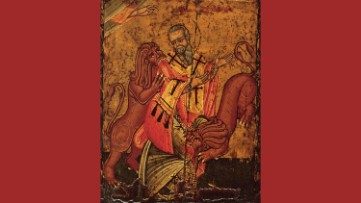St. Ignatius of Antioch, Bishop, Martyr in Rome

A precious link to the Apostles
For the Christians of the first and early second centuries, Christianity was like an explosion of light not only in the world but in their lives. It was new life, something so unexpected and undeserved that, persecutions notwithstanding, all they could do was praise. The man named Ignatius – he liked to call himself Theophoros, or “God-bearer” – was a part of this Church of the Apostolic age. We know little of his early life. Tradition has it that he was a convert. Whatever his origins may be, he became the second or – if we count St. Peter as the first – the third bishop of Antioch, in the Roman province of Syria, the city where “the disciples were for the first time called Christians” (Acts 11:26). Ignatius was a friend of St. Polycarp, who was a disciple of St. John, so it is possible that Ignatius, too, knew the beloved disciple.
Almost everything else that we know of him comes from the seven letters he wrote after his arrest, which the historian Eusebius of Caesarea places during the reign of the Emperor Trajan, somewhere between the years 107 and 110AD. The letters were addressed to Christian communities that Ignatius passed by as he was escorted by “wild beasts” – Roman soldiers – from Antioch to Rome, where he would be fed to far more literal wild beasts. These letters are a precious testimony to the life and the faith of the Apostolic Church.
Testifying to the Word made flesh
Ignatius wanted to set “Judaizing” Christians free of the notion that they had to follow the Mosaic Law, for the old dispensation had been fulfilled in the new. Rather than being concerned with the countless proscribed activities of the Jewish Sabbath, he wrote, Christians ought to celebrate the “eighth day,” the day of the Resurrection, “as a festival,” for on that day “our life … sprang up again … and the victory over death was obtained in Christ.”
But above all, Ignatius was a tireless witness to the Word made flesh, countering the seductive teachings of the Docetists, who taught that the Word of God had become flesh only in appearance, not in reality. The latter, for the Docetists, would have been all too humiliating for God. Ignatius, on the other hand, saw the Incarnation as supreme testament of God’s mercy. This testament is, first of all, the real body of our Lord Jesus Christ: “There is one Physician … both made and not made; God existing in flesh … even Jesus Christ our Lord.” But it is also the Church. Ignatius is the first to use the word katholicos, or universal, to describe the Body of the Lord, the Church wherever it is gathered around a bishop assisted by his priests and deacons: “Wherever the bishop appears, there let the people be; as wherever Jesus Christ is, there is the catholic Church.” Finally, there is “God’s bread … the flesh of Jesus Christ”: the Eucharist, which Ignatius called “the medicine of immortality.”
Becoming “Christ’s pure bread”
This bread is the Eucharist that Ignatius celebrated as bishop, but it is also the eucharist, or “thanksgiving,” that Ignatius himself would become. Writing to the Church of Rome, which he calls “pre-eminent” among all the Churches in charity, he asks them not to appeal his death sentence. In this extraordinary letter, Ignatius writes, “I am God’s wheat and shall be ground by [wild beasts’] teeth so that I may become Christ’s pure bread…. Do not stand in the way of my birth to real life.” “Within me is the living water that says, deep inside me, ‘Come to the Father!’ I no longer take pleasure in perishable food… I want only God’s bread, which is the flesh of Jesus Christ … and for drink I crave his Blood, which is love that cannot perish.”
This bishop who had the testimony of the apostles reverberating in him was ground like wheat – the iconographic tradition presents him clear-eyed and serene as lions seize his body. That is how he became living bread. He desired to be, and became, a sacrifice of praise.







